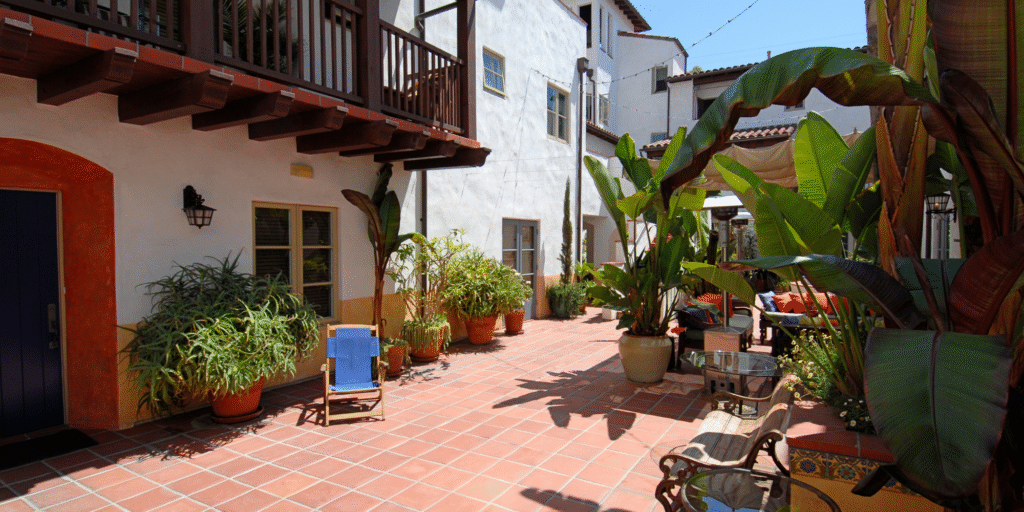The English language is full of surprises—and some of them are distinctly Spanish. You might be surprised to learn that everyday English words like “mosquito” or “patio” were originally borrowed from Spanish.

Spanish Steps and Trinita Dei Monti church
In this blog, we’ll explore 17 common words in English that have roots in the Spanish language. From foods to fashion to wild landscapes, Spanish has quietly shaped the way we speak.
1. Breeze
From: Brisa (Spanish)
You might think “breeze” is purely English, but its origins trace back to the Spanish word brisa, meaning a light wind.
2. Canyon
From: Cañón
Used to describe deep ravines or valleys, “canyon” comes from cañón, literally meaning “tube” or “pipe” in Spanish.
3. Mosquito
From: Mosquito
A direct translation of “little fly.” The suffix -ito is a diminutive form in Spanish—so mosquito literally means “small fly.”
4. Patio
From: Patio
The word “patio” comes directly from Spanish, where it refers to a courtyard or open space, often at the center of a home.

Spanish-style patio with tile and courtyard
5. Fiesta
From: Fiesta
Common in English to describe a party, fiesta means a religious festival or celebration in Spanish. It’s all about joy and gathering.
6. Taco
From: Taco
From street food to global fame, the word “taco” kept its form. In Spanish, it refers to the folded tortilla and filling—but also means “plug” or “wad” in other contexts.
📍Related: A Beginner’s Guide to Tapas Culture in Spain
7. Guerrilla
From: Guerrilla (diminutive of guerra, war)
Originally used to describe small bands of fighters using ambush tactics during the Peninsular War in Spain.
8. Savvy
From: Sabe (he/she knows)
“Savvy” comes from the Spanish saber (to know). It evolved through sailors and trade lingo—originally used as “do you savvy?”
9. Lasso
From: Lazo (Spanish for rope or snare)
The tool of the cowboy, “lasso,” evolved from the Spanish lazo, meaning loop or bow.
10. Drama (via Spanish/Latin roots)
From: Spanish and Latin drama
While not unique to Spanish, its adaptation into English came through Spanish and French in the 16th century.
11. Rodeo
From: Rodear (to surround)
“Rodeo” in Spanish means a roundup—literally “encircling” livestock. In English, it became associated with cowboy sports and cattle shows.
12. Volcano
From: Volcán (Spanish)
Spanish explorers passed along the word volcán, taken from Latin Vulcanus (god of fire), into English during the Age of Discovery.
13. Sombrero
From: Sombra (shade)
Sombrero comes from the Spanish word for “shade.” It describes any wide-brimmed hat used to block the sun.

Traditional wide-brimmed sombrero
14. Chili
From: Chile (Nahuatl via Spanish)
“Chili” entered English via Mexican Spanish, itself borrowed from the Nahuatl chīlli. Now, it’s used for both the pepper and the spicy stew.
15. Macho
From: Macho (manly)
Used in English to describe hyper-masculine behavior, macho in Spanish simply means “male.”
16. Canoe
From: Canoa (Spanish via Taíno)
Adopted from the indigenous Taíno word canoa, brought into English by Spanish explorers documenting their travels in the Americas.
17. Banana
From: Banana (via West African–Spanish trade routes)
Though its root is West African, “banana” entered English through Spanish and Portuguese traders.
✨ Final Thoughts: Spanish is Hiding in Your English!
You don’t need to speak Spanish fluently to realize how much of it is woven into the English language. From foods to fashion to natural wonders, the influence of Spanish is everywhere.
📌 Save this post, share it with a fellow language nerd, and keep an eye out for other words hiding in plain sight.
💬 Want to explore more about Spanish? Read our Beginner’s Guide to Learning Spanish or Tapas Guide to dive deeper!
